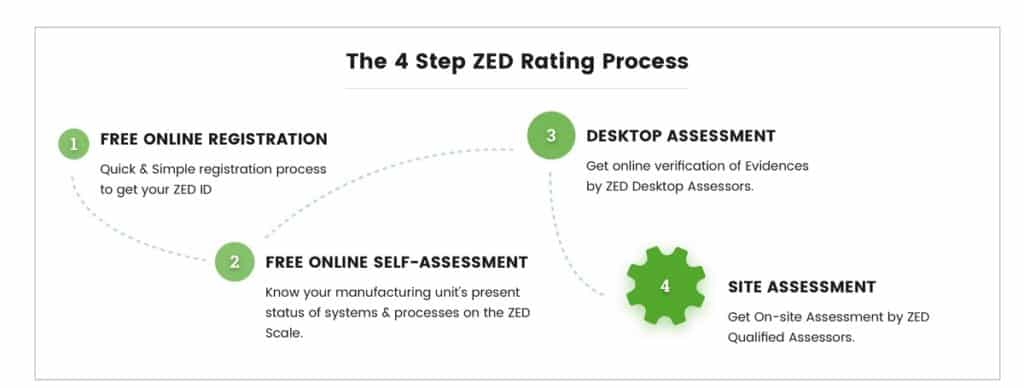As a part of Make in India, ZED scheme for MSMEs with ideology of Zero Defect and Zero Effect ideology was put forth in 2016. Following this will encourage improved quality products produced in the MSME sector. Addressing the urgent need to assess the quality of the products in this sector, the implementation of the ZED Maturity assessment model seemed obligatory. Further, the awareness to use proper ZED manufacturing will lead to elevated product production alongside reduce waste.
The scheme assesses and evaluates MSMEs efficiency in curbing pollution, Production capability, Financial status, Product and service quality, power usage efficiency, HR, Design, etc. Zed assessment in MSMEs goes through 50 parameters and issues the certificate only after MSMEs utilise the tools to reduce wastage and improve efficiency. Government’s budget for the year 2019-20 stood at 116.94 crores out of which government contribution was at 100 crore and rest private MSME contribution of 16.94 crore.
Scheme Endeavours to Attain the Following Key Goals
- To promote and encompass ZED manufacturing processes in the MSMEs.
- Encourage to attain a continuous momentum in improving the sector that contributes to the success of Make in India initiative
- Reassure to adapt Quality tools and systems, thus promote energy-efficient manufacturing.
- Make sure that the MSMEs are constantly upgrading their tools and process to obtain better products.
- Most importantly, the acclimatization to ZED protocol to have a minimalist impact on the environment.
Nature of Assistance under ZED
MSME-DC and GoI have contributing Rs 16.94 and 100 crores respectively, thereby allotting Rs 116.94 crore in total. The Government contributes to the scheme by providing subsidiary to MSM enterprises in the following manner:
- Micro enterprises: 80% subsidiary
- Small enterprises: 60% subsidiary
- Medium enterprises: 50% subsidiary
- Special category (headed by SC/ ST/ Women/ NER): An additional 50% subsidiary
- Assessment, Re-Assessment, Gap analysis, and handling shall be given provision depending on the requirements
Benefits for ZED Valued MSME
- 0.5% interest rate concession on loans
- 50% reduction in the processing fee
- Government of India provides Rs 25 lakh for adopting new technologies or setting up ETP.
- 5 Lac to purchase testing equipment
- 10 Lakh for Zed Certification and handholding
- For Domestic and International patent registration will be able to claim Rs 10 lakh and Rs 25 lakh respectively
Eligibility
All MSME registered with the Udyog Aadhar Memorandum is eligible for enrolment under the scheme.
Procedure
The protocol for enrolment will be in 4 stages
Stage 1: Registration- This step to register via the online portal of ZED
Stage 2: on the website, go to assessment. Valid phone number and email address must be used during registration.

Stage 3:
Self-assessment- Free online assessment binding the enterprise to the ZED parameters carried out after the desktop assessment.
S Site-assessment- This is dependent on if selected during Desktop valuation.
Stage 4:
Consultancy- Availing the service of adviser on Gap-analysis and handholding.
The final approval given by NMIU or PMAC
Contact:
Principle Director, MSME-TDC 14 (PPDC), Foundry Nagar, Agra-282006
MSME- development institutes (DC- MSME)
Email- info@ppdcagra.com